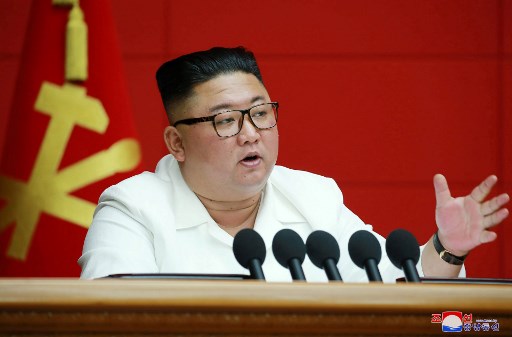By Choe Sang-Hun
SEOUL — Battered by international sanctions, a global pandemic, and flood damage, North Korea on Thursday (20) admitted for the first time that it had failed to achieve the economic goals of its leader, Kim Jong Un.
To chart a new course for its economy, the North plans to hold a rare ruling Workers’ Party congress in January, the state news media reported.
At the last party congress in 2016, which was the first such meeting in 36 years, Kim had adopted an ambitious five-year economic plan to build what he called a “powerful socialist country.” The plan was for Kim to celebrate his achievement during the party’s 75th anniversary on October 10 this year with pomp and spectacle.
But things have hardly transpired as Kim had hoped.
North Korea had already been struggling under the stranglehold of United Nations sanctions. Then, last week, the North Korean leader admitted that his nation was also facing “two crises at the same time”: fighting the spread of the coronavirus and coping with extensive flood damage. But he ordered his country not to accept any international aid for fear that outside help might bring in COVID-19.
Those triple punches prompted the no-nonsense assessment by Kim during a party meeting Wednesday, an unprecedented admission by the isolated country that its economic plans had faltered.
Plans to improve the national economy have been significantly delayed by “severe internal and external situations and unexpected manifold challenges,” the Central Committee of the Workers’ Party said during the meeting in Pyongyang, the capital. It also noted that people’s living standard had “not been improved remarkably.”
The committee decided to convene the new party congress, North Korea’s biggest political decision-making event, in January to set forth “strategic and tactical policies,” the North’s official Korean Central News Agency reported Thursday.
When Kim took power after the death of his father and predecessor in 2011, Kim Jong Il, he vowed to ensure that his people, long-suffering from multiple maladies, would “never have to tighten their belt again.” In 2016, when he adopted his economic plan, the North’s economy grew 3.9%, the highest since a devastating famine hit the country in the late 1990s, according to estimates by the South’s central Bank of Korea.
The growth was largely the result of ramped-up exports of coal, iron ore, textiles, and fisheries to China. But the U.N. Security Council banned such exports after the North rapidly expanded its weapons programs, testing three intercontinental ballistic missiles in 2017, as well as what it said was a hydrogen bomb.
As the sanctions tightened, the North’s economy shrank 3.5% in 2017, according to the Bank of Korea. It contracted 4.1% the following year, with its exports to China plummeting 86%.
North Korea’s economy recovered slightly last year, growing 0.4%, as Pyongyang invented ways of easing the pain of the sanctions, such as smuggling banned cargo across the Chinese border at night or between ships on the high seas. It also exported practically anything not banned by the sanctions: cheap watches assembled with Chinese components, artificial eyelashes, wigs, mannequins and soccer balls.
But this year, the coronavirus forced the country to shut down the border with China, which had accounted for more than 90% of the North’s external trade. North Korea’s exports to China plummeted to $27 million in the first half of this year, a 75% drop from a year earlier, according to the Korea Institute for National Unification in Seoul. Imports from China dropped 67%, to $380 million.
Fitch Solutions, which had predicted economic growth of 3.7% in North Korea this year before the pandemic hit, now forecasts a record 8.5% contraction for the North.
In his speech at the party meeting Wednesday (19), Kim said his country faced “unexpected and inevitable challenges” this year, and critiqued the “achievements and shortcomings” of his own government, the state news media reported. But so far, he has shown no sign of backing down on his nuclear weapons program.
After he failed to persuade President Donald Trump to lift sanctions during their meeting in Vietnam in February last year, Kim said his government would slog through the sanctions.
In his New Year’s message, Kim asked his people to prepare to “tighten our belts” again. He also vowed to strengthen his nuclear weapons program, threatening to end his moratorium on nuclear and long-range missile tests.
In another aggressive move, North Korea in June blew up an inter-Korean liaison office — a symbol of the relatively warm ties between Kim and President Moon Jae-in of South Korea — after blaming the South for failing to increase inter-Korean economic exchanges.
Moon’s new national security adviser, Suh Hoon, plans to meet Yang Jiechi, China’s top diplomat when Yang visits the South Korean city of Busan on Friday and Saturday. The two officials are expected to discuss North Korea and a potential trip to Seoul by China’s top leader, Xi Jinping, Moon’s office said.
-NYT


